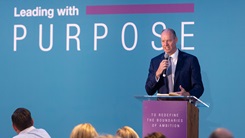The Modern Era of Programme Leadership
Defined by collaboration, communication, and connection, the modern era of delivery demands that leaders seek to achieve the best physical outputs and a series of wide-ranging, long-term outcomes that not only support the client, but also benefit communities, the wider industry, and the workforce at every level of the supply chain.
Why is this increasingly becoming recognised as the way to lead delivery teams to success? At the heart, writes Davendra Dabasia, Mace’s CEO for Consultancy, it’s about creating a culture that motivates, empowers and inspires people to do great things.
Implement interpersonal skills
Leadership in our industry has traditionally been characterised by domineering personalities focused on delivering on time, to budget and at quality. And, to be clear, this isn’t in itself a bad thing. But the landscape has dramatically changed. The increased scale and complexity of modern programmes requires more of leaders than ever before and the inertia that can result from a one-track delivery mind can bring problems. From handling a wide range of stakeholder opinions to economic uncertainty, ensuring team wellbeing and the pressure of meeting sustainability targets, the modern programme director needs to balance competing demands to get the best outcome.
It takes a level-headed programme director with expert people skills to get the job done. Directors should view their role not just as a responsibility to deliver the best results for clients, but to demonstrate the best ways of working. To achieve this, a good set of soft skills is imperative. For instance, the standard of communication in a team can make or break a project. When people are hesitant to bring their concerns to leaders from the onset, these problems only grow to stifle or even halt progress down the line. But when issues are shared early on, potential problems can be tackled collaboratively, minimising delays and increasing the likelihood of innovation.
The leader doesn’t need to find the solutions alone. By working with the client to establish a long-term vision that acknowledges the need for a modern approach, the recruitment strategy can follow suit. For instance, on the Go Expansion programme in Canada, we’ve established a team with integrated stakeholder and communications professionals, who work alongside the programme leadership to ensure seamless communication across both internal and external stakeholders. It’s working well because our leaders value the profession and trust the team to deliver their message in the right way; this is a direct result of establishing a one-team culture from the outset.
Influencing team culture
A great leader knows that the most effective, productive teams are not just created by hiring good people but by creating an environment where those people can thrive. Yet a positive, trusting work environment takes time and consistency to cultivate. Applying these principles like crossing items off a checklist will not work. It requires genuine effort and authenticity. People can often sense disingenuity from a mile away; a true connection is created when you are honest and open. Leaders who model openness, transparency and inclusivity set the scene for a team that is equipped to innovate and problem-solve in inspiring ways that harness the diverse perspectives at their disposal.
Leaders who create a culture of empowerment and innovation will reap rewards in the form of motivated team members who are hungry to develop. People are always progressing, growing and changing, and a great leader drives this development in a direction that benefits not only the project but the industry. When leaders learn to delegate effectively, they provide opportunities that stretch team members and challenge them to grow. One such example is Oliver Conde's journey at Mace. Joining the business as a senior manager, Oli has risen to become our Regional Director for Latin America, in just a few years. His story exemplifies how programme directors should trust their capable team members who will seize opportunities to grow. It’s a win-win for everyone.
Establish a shared vision
Great teams are built to last when a stable foundation, comprised of a clear vision, strong governance, and effective processes, is established. However, programme delivery is a long and complicated process so it is easy to get lost in the weeds. Although it may be tempting to rush through the initial stages, the quality of planning at the beginning determines the standard of work by the end. The first 12 months are the most important as this is when those key components are determined.
On a recent podcast episode with the CIOB, I discussed the importance of setting a vision, noting the criticality of uniting teams around a central goal that enables everyone to work towards a shared purpose. When colleagues have a clear direction, they can flourish in their work with confidence. While disagreements may emerge, a shared goal provides the opportunity to align on what ultimately matters.
Delivering the London 2012 Olympic venues is a prime example of this approach. Focused on creating the best event in sporting history with the best outcomes for local communities, our work on the games pioneered the delivery partner model and transformed programme delivery for the industry. By aligning and working in lockstep with the client to set a clear vision and establish robust governance and processes from the outset, we were able to deliver a successful programme that continues to serve as a benchmark for how to think long-term and prioritise legacy.
Indeed, a measure of the success for any great programme director is the legacy they leave behind. This legacy is not only defined by the leaders they nurture but also by the lasting impact of their work. By focusing on the people who get the work done, rather than the work itself, we create leaders at every scale. Innovation, productivity and quality are the fruits of great leadership that continue to serve the industry and drive positive outcomes for everyone.












